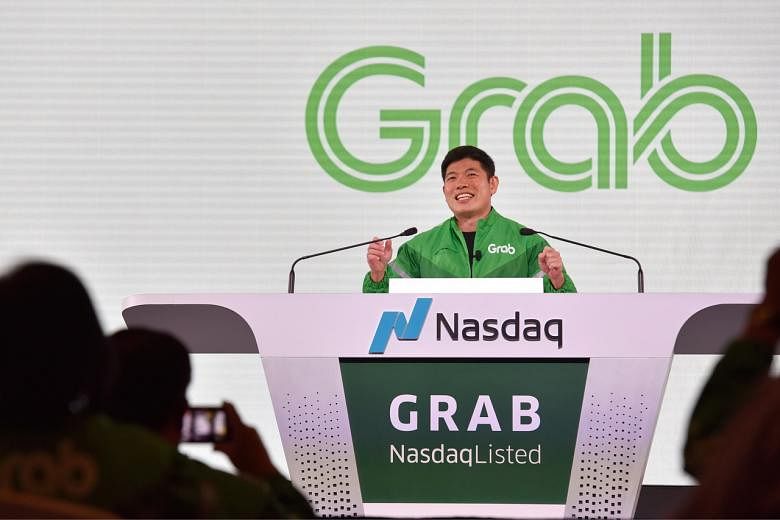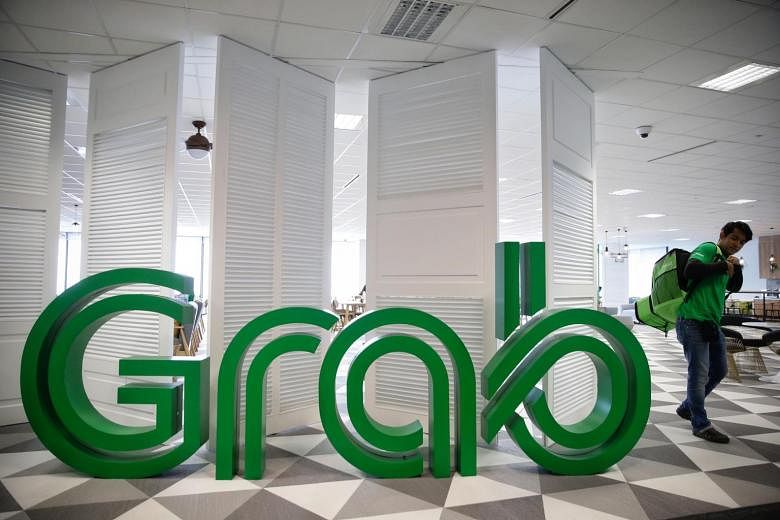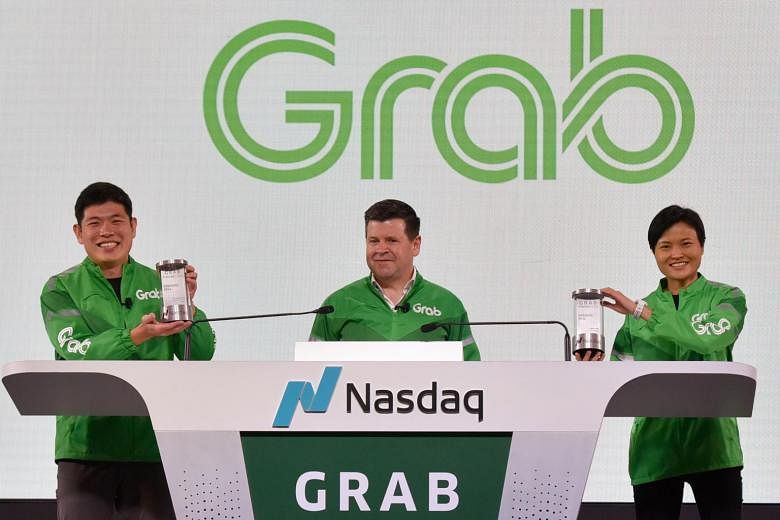S'pore had new billionaire for a few hours before Grab shares slid in US debut
Grab co-founder Anthony Tan's stake, initially worth more than a billion dollars, ended at US$725 million (S$992 million).
PHOTO: REUTERS
DEC 3, 2021
SINGAPORE (BLOOMBERG) - "The stock will go up and it will go down," said Mr Anthony Tan, co-founder of Grab Holdings, moments after
Nasdaq's bell-ringing ceremony in Singapore on Thursday night (Dec 2), the first such event held in South-east Asia.
He was right on the money. Grab soared in pre-market trading in New York but after opening 18 per cent higher at US$13.06, the shares tumbled 20.5 per cent to close at US$8.75 on its first day.
The stock made its debut after the ride-hailing and delivery company completed its merger with the blank-cheque firm of Silicon Valley investor Brad Gerstner's Altimeter Capital Management, the largest deal yet to close for a special purpose acquisition company (Spac).
The slide wiped about US$17 billion (S$23.3 billion) from the market value of the company and meant that Mr Tan's stake, initially worth more than a billion dollars, ended at US$725 million, according to the Bloomberg Billionaires Index.
Grab has yet to post a profit, but investors had largely welcomed the transaction, which raised US$4.5 billion in gross proceeds. Those include US$4 billion in private investment in public equity, or Pipe, marking the biggest US public market debut by a South-east Asian company. Singapore investment company Temasek, BlackRock and Fidelity International are among those that joined the Pipe.
The timing for going public, though, was not optimal. The Covid-19 pandemic has severely hampered ride-hailing businesses, and the Omicron variant is causing new limits on travel. Grab's home country of Singapore
banned entry from seven African nations last week, and the Government said on Thursday that it had
detected two imported cases of Omicron.
It had already been a turbulent year for Grab. Its merger with Altimeter Growth Corp,
announced in April, got delayed due to an audit of the past three years' accounts, sending Altimeter shares for a wild ride. At the same time, the Spac boom that has attracted billions of dollars in the past couple of years has shown signs of easing amid increased regulatory scrutiny.
Mr Tan, whose great-grandfather was a taxi driver, was inspired to start Grab while working on his Master of Business Administration at Harvard Business School more than a decade ago. He gave up his family's business, one of the biggest auto distributors in Malaysia, and instead started a taxi-hailing service then known as MyTeksi with
his Harvard classmate, Ms Tan Hooi Ling.
The project was later relocated to Singapore after raising money for a regional expansion and was rebranded as Grab in 2016. The company now also does food delivery, online payments and financial services.
Due to Grab's share-class structure, Mr Tan has 60.4 per cent voting rights even though he owns just 2.2 per cent of the company. If he fully exercises his stock options, his voting rights will increase to 66.11 per cent, according to a recent filing.
Even with today's slide, the deal has created considerable wealth for other key executives of the Singapore company. The holdings of Ms Tan, the co-founder, are now worth US$224 million, while president Ming Maa's are worth US$126 million.
But it is SoftBank Group, which poured about US$3 billion into Grab through a series of investments starting in 2014, that has made the most from the listing. Its 18.6 per cent holding is currently worth US$6.1 billion. Uber Technologies and Didi Chuxing Technology have stakes worth US$4.7 billion and US$2.5 billion respectively.
While Grab has generated wealth, its loss widened to US$988 million in the third quarter from US$621 million in the same period last year as revenue declined about 9 per cent to US$157 million. The increase in losses was mainly driven by non-cash expenses, and a "significant portion" of such costs should drop after the business combination.
The ongoing pandemic also took a toll on Grab's operations as demand for mobility services dwindled amid stricter lockdowns in Vietnam and restrictions across the region. Moreover, the company is facing growing competition after its Indonesian rival, Gojek, merged with e-commerce provider PT Tokopedia. GoTo, the combined entity, is preparing for an initial public offering at home and in the United States next year.
But Mr Tan remains confident that things will get better for Grab as more people get vaccinated in the region and opt to pursue the strategy of living with Covid-19.
"We are confident about our business," he said in an interview on Thursday.
The business "is tracking well" in terms of meeting this year's target of gross merchandise value of US$15 billion to US$15.5 billion, he added.








